
In BASIS International & Bilingual Schools • China’s (BIBS•C) immersive English learning environment, students are challenged with complex and rigorous academic material and high-intensity discussions. English usage surpasses the scope of basic language skills. It is not only a medium for communication and learning but also a crucial tool for academic analysis, critical thinking, and in-depth expression. Students must quickly grasp the core concepts of their courses, develop independent thinking and problem-solving abilities, and present their ideas in a logically sound and organized manner through academic writing and classroom discussions. The cultivation of these language skills not only impacts their academic performance but also directly determines whether they can stand out in a globalized academic environment.
We place a strong emphasis on systematic English language support within our fully English-language teaching framework to ensure that students are well-prepared to tackle various academic challenges. Our support goes beyond just classroom instruction. Students continuously enhance their language skills through ongoing, multi-layered language training and real-world application. This foundation is essential for achieving academic excellence and future success.
English Language Learning (ELL) Program
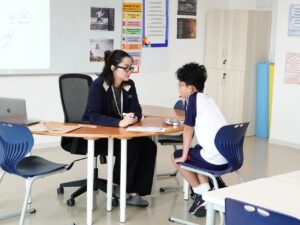
To support this rigorous language environment, BIBS•C offers an English Language Learning (ELL) program tailored to meet diverse student needs. This program is designed to create and implement tailored tutoring plans that help students enhance their language skills, ensuring they thrive academically, socially, and emotionally. Whether improving reading comprehension or boosting speaking confidence, ELL teachers work closely with students to help them confidently navigate different English language situations.
“The language support program has turned confused faces into smiles, fostering a positive atmosphere that makes both the content and language acquisition process enjoyable,” shared Omar Ricci, a Middle School History Teacher at BASIS International & Bilingual Schools Chengdu. “Language learning is closely tied to emotional processes, and having ELL teachers support this alongside subject teachers adds a valuable layer of encouragement, making the journey smoother and more enjoyable for students.”
ELL Framework
BIBS • C’s ELL framework combines various support methods to meet each student’s unique needs, including “push-in” and “pull-out” sessions. These sessions enable ELL teachers to provide focused, individualized instruction, while ensuring continuity with classroom learning.
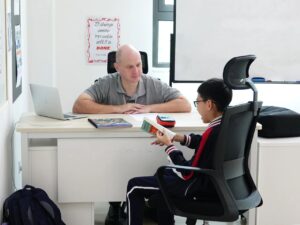
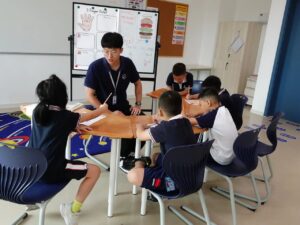
Push-in
In push-in sessions, ELL teachers cooperate closely with classroom teachers to provide language support. They implement clear and engaging activities to enhance ELL comprehension. For instance, they might create a visual display of new vocabulary words for students to reference throughout the year. This approach reinforces vocabulary retention and encourages students to use new words in writing and speaking, thereby improving their language skills. They also use games like bingo, silly sentences, and word puzzles to make vocabulary and grammar practice enjoyable, reducing anxiety, and encouraging risk-taking in language use.
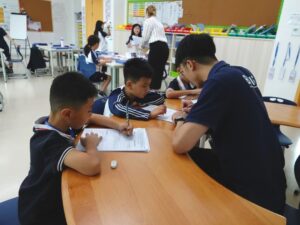
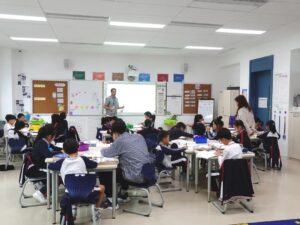
“Collaborating with ELL teachers has profoundly impacted student engagement and confidence in my classroom,” said Ricci. He described how this support has boosted student confidence, transforming their motivation: “They’re more eager to complete assignments and participate actively. When students feel confident, their entire relationship with the class changes, shifting from hesitant and unsure to enthusiastic and engaged.”
“Collaboration between ELL teachers and Subject Expert Teachers (SETs) can be incredibly beneficial for ELL students, particularly those who may have additional learning needs. When ELL teachers and SETs work together, they can create a more inclusive and supportive classroom environment that fosters both engagement and confidence among students,” noted Margaret Siglock, Chair of ELL at BASIS International & Bilingual Schools Chengdu. “This team approach not only improves the learning experience but also boosts student confidence. ELL students feel more supported when they see that their teachers are working together to help them succeed. This can reduce feelings of isolation and frustration, empowering them to take more risks in their learning, ask questions, and participate more actively in class activities.”
Pull-out
Based on students’ learning needs, ELL teachers also pull them out of the classroom and provide personalized English tutoring in a smaller, more supportive setting. “During pull-out sessions, ELL students receive targeted language instruction that addresses their specific needs, whether that’s building vocabulary, improving grammar, or developing speaking and listening skills,” explained Siglock. “These sessions give students the opportunity to practice language skills at a pace that’s tailored to their level of proficiency, which helps build their confidence and academic fluency. Importantly, pull-out support allows ELL teachers to assess and monitor progress more closely, ensuring that each student is progressing in their language development and is not falling behind academically.”
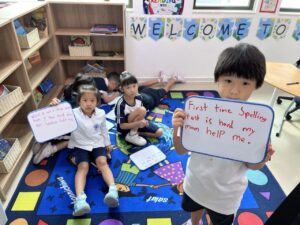
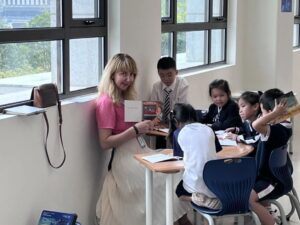
Student Hours
During student hours, ELL teachers offer a variety of tailored English support sessions to help students improve their language skills. These sessions are designed to meet the individual needs of each student and cover a wide range of areas, including grammar lessons, reviewing class material, and reinforcing vocabulary.
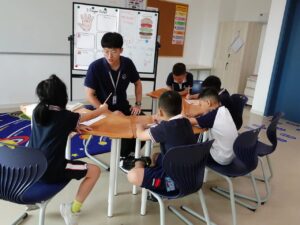
Language Acquisition in Core Classes

BIBS • C offers comprehensive language support from early childhood through high school, enabling students to confidently use English for academic discussions while seamlessly navigating both languages in everyday life. This approach nurtures bilingual thinking skills. As students grow, we provide tailored language programs to meet their evolving needs, ensuring steady improvement in their English proficiency at every stage. This foundation prepares them to excel academically and thrive in an increasingly globalized world.
“Integrating language support structurally in the classroom has indeed helped my students’ language acquisition and subject understanding,” shared Ricci. “There’s a strong correlation between daily reinforcement of language skills and deeper content comprehension, as the language tools help students internalize subject content more effectively and independently.”
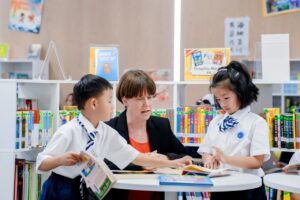
Early childhood is a critical period for language learning. By being exposed to a rich language environment in kindergarten, children can not only expand their vocabulary but also gradually grasp grammar and expression skills, helping them communicate better with peers and teachers, and laying a solid foundation for future academic learning. To this end, we have designed a comprehensive language curriculum for kindergarten students, incorporating daily letter reading and writing exercises, as well as word spelling games to help them better adapt to the English learning environment.
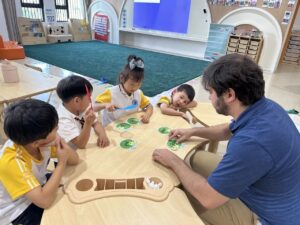
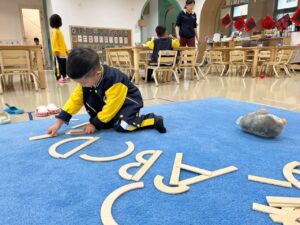
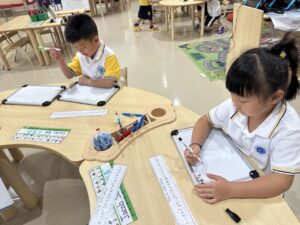
In primary math classes, teachers encourage students to take their notes in English to help them grasp the material effectively. They also prompt students to summarize what they’ve learned in class using words and diagrams, boosting their understanding of language and math concepts. Additionally, teachers create a word wall in the classroom to help students review and reinforce the new vocabulary they’ve picked up.

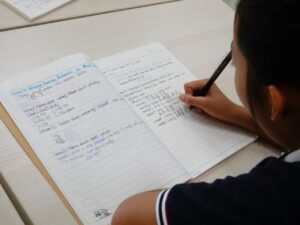
In primary humanities classes, teachers incorporate note catchers and organizers to help students outline the structure of the articles they study, boosting their reading and writing skills. They also reinforce the practical application of new language expressions through sentence frames. For students who struggle, teachers provide personalized one-on-one support to help them grasp the meaning of the texts more effectively.
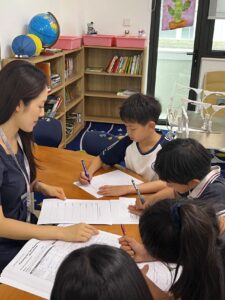
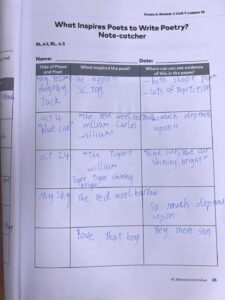
In upper school English classes, to improve students’ writing skills, the teacher first has students complete their writing assignments independently and encourages peer editing to learn from each other’s strengths. Afterward, the teacher provides specific feedback on improving their essays and offers targeted learning suggestions based on each student’s needs.

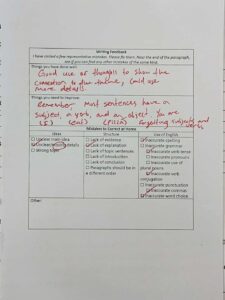
In upper school history classes, to help students better understand complex texts, the teachers have introduced the CHA reading method, in which students circle unfamiliar words, highlight the main ideas, and add annotations beside the text for easier comprehension. Under the teacher’s guidance, students use the CHA reading method to unravel the meaning of the text step by step, enhancing their overall English language skills.

In upper school science classes, the large number of science vocabulary poses a significant challenge for students. We use flashcards to let students practice the vocabulary they have learned, and we also allow students to draw pictures or make models to understand scientific content. For example, we use flashcards to learn different lab tools, and students also work in groups to create diagrams or models to show what they have learned about cell structures.

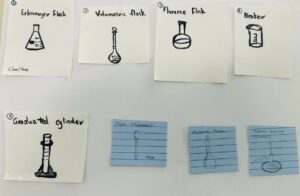


In the lab class, the teacher also guides students to review science vocabulary and encourages them to verbally explain their experimental designs. Through demonstrations, the teacher connects English vocabulary with physical objects, enhancing the integration of students’ English skills with their subject knowledge. After the experiment, the teacher also requires students to write lab reports, further improving their logical expression and academic writing skills in English.
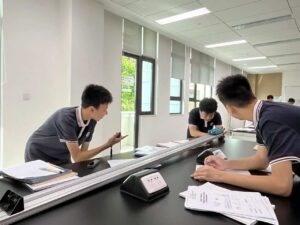
Co-Teaching to Support Language Acquisition
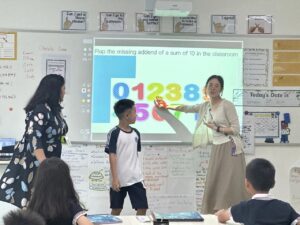
Throughout ECE and Primary School, a collaborative teaching model pairs Learning Enhancement Teachers (LET) and Subject Expert Teachers (SET), providing students a diverse and high-quality educational experience. In this approach, the LET and SET work closely, combining their strengths to design course content that supports comprehensive development in language, culture, and subject knowledge. The LET monitors the overall classroom atmosphere and focuses on students who need extra help. By observing their interactions—asking questions, checking notes, and reading facial expressions—the LET quickly assesses students’ understanding and offers immediate support with concepts and vocabulary. Additionally, as an emotional anchor for students, the LET actively encourages them to participate in class discussions. The LET helps build a bridge from understanding to expression by explaining and translating specific words, easing their concerns about speaking in English and fostering their growth.
Conclusion
The importance of language proficiency extends throughout daily learning and is closely tied to students’ future paths of studying abroad. Students with strong English language skills will be able to integrate into the local culture of English-speaking countries more quickly and effectively, gaining valuable information through efficient communication and benefiting from it. BIBS•C strives to nurture students as active global participants, emphasizing their international outlook and cross-cultural communication skills. Therefore, we uphold high standards and expectations for students not only in our curriculum but also in building a strong foundation for their future through language proficiency.
Contributors: BASIS International & Bilingual Schools Chengdu faculty and staff
Visit our careers website for more information about teaching with BASIS International & Bilingual Schools and apply for an open ELL position today!